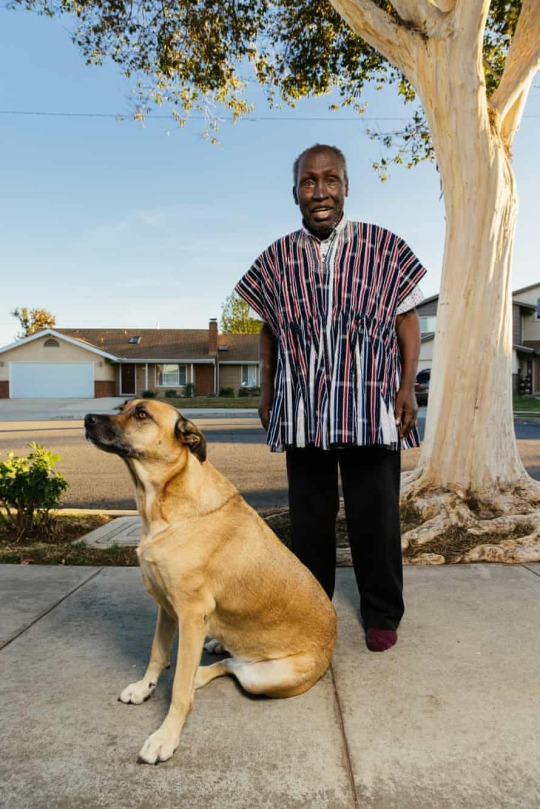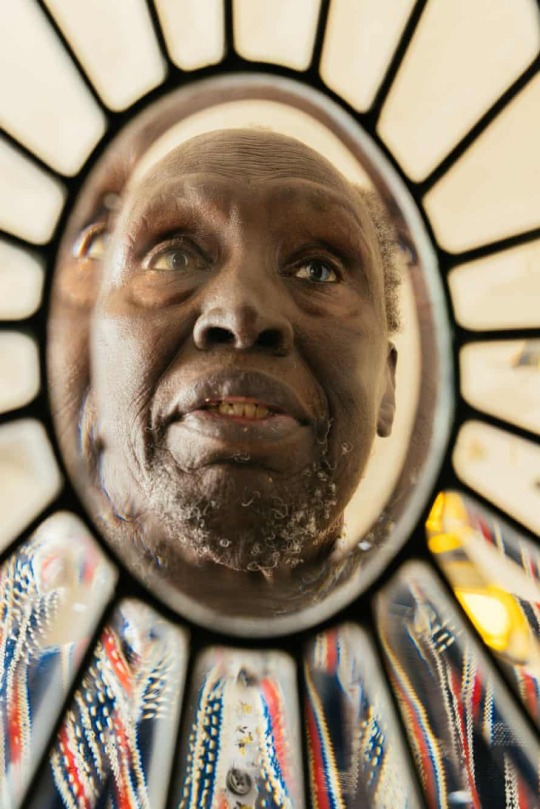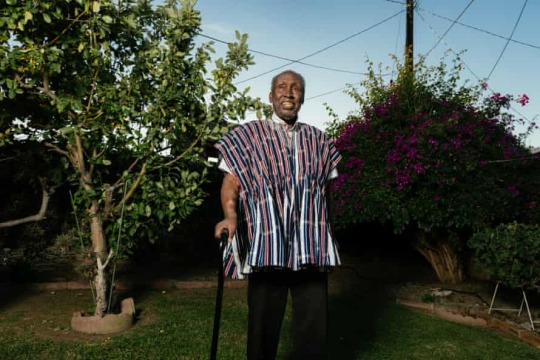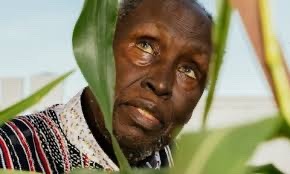#kenyan literature
Quote
‘Peace, God the Giver Supreme, look after those two.
When the sun becomes too hot, lead them to cool shade.
When it rains and storms, lead them to a shelter.
If they encounter a dangerous animal,
Close its eyes so it does not see them.
Remove out of their way holes, illnesses, and ogres.
Wherever they end up, they are my children.
Ngũgĩ wa Thiong’o, The Perfect Nine
3 notes
·
View notes
Text
Why did Africa let Europe cart away millions of Africa's souls from the continent to the four corners of the wind? How could Europe lord it over a continent ten times its size? Why does needy Africa continue to let its wealth meet the needs of those outside its borders and then follow behind with hands outstretched for a loan of the very wealth it let go? How did we arrive at this, that the best leader is the one that knows how to beg for a share of what he has already given away at the price of a broken tool? Where is the future of Africa?
Ngũgĩ wa Thiong'o, Wizard of the Crow, 1st January 2006
#ngugi wa thiong'o#kenyan literature#occupation#africa#anti imperialism#anti colonialism#writing back#books and libraries#quotation#world literature
16 notes
·
View notes
Text



African literary giant, Ngugi wa Thiong'o.
📷 Michael Tyrone Delaney
10 notes
·
View notes
Text
I’M BAAAACK...
I’ve been away for quite awhile but I’m back now. Exciting things have been happening, vis-a-vis my creative life, not the least of which are four children’s books which will be published soon by the East African Educational Publishing Company, which currently distributes books to schools in Kenya, Rwanda and Zambia. Keep your eye peeled on this page for this & other news on mental health awareness, Gikuyu (also Kikuyu) language & culture and more.
#Waithira Mbuthia-Protano#waithirambuthia#writers and poets#kenyans#african writers#women writers#childrenbooks#mentalheathawareness#american writers#american women writers#translations literature storytelling#poetry#poems#grieving#losing a child to suicide
0 notes
Text
11 African Books To Read in the Wake of Uganda’s Anti-Homosexuality Law
We find that books are a great way to process social and political events that seem very confusing and even disheartening. Books expand our knowledge and help us take informed and ethical position on issues. This week’s list responds to the recent anti-gay law passed in Uganda. We’ve put together 9 books by African writers that bring light to the struggle for LGBTQ freedom.
On March 21, Uganda passed the 2023 Anti-Homosexuality Bill, which criminalizes same-sex relationships in one of the world’s harshest anti-gay laws. According to this bill, people identifying as LGBTQ+ or promoting homosexuality in any way could be put in prison for up to 20 years. Further, any social behavior that falls under the category of “aggravated homosexuality” will result in a death sentence.
We have been thinking about what these anti-gay laws mean for African writers sharing queer experiences through literature or memoirs. In a Twitter conversation we had with Kenyan poet and activist Shailja Patel, Patel explains that the law will certainly stifle creative work centered on LGBTQ experiences:
The bill outlaws the “promotion of homosexuality,” and imposes criminal sanction on anyone who “advertises, publishes, prints, broadcasts, distributes” material, including digitally, that can be regarded as “promoting or encouraging homosexuality.” This is a blanket ban on LGBTQ characters or stories in Ugandan literature and culture…If queerness, queer people and queer expression can no longer exist in Ugandan literature, TV, films, music, art, theatre, dance, and media, then Ugandan culture is immeasurably impoverished.
We hope that this harsh and unfortunate law gets rolled back. In the meantime, here are 10 African books to read that powerfully celebrate the diversity and spirit of queer life and culture in Africa.
26 notes
·
View notes
Note
hey! i just finished my grade 12 exams and was looking into studying in germany. i was just curious what exactly you’re doing right now?
hi! so I have been waiting for someone to ask me this omg!!! currently cracking my knuckles opening up my laptop to answer this one
curriculum
so! essentially the main thing here is whether your high-school diploma is enough for university study, i.e: is it qualified as a Hochschulzugangsberechtigung, HZB. I did the International Baccalaureate diploma, and based on the curriculum (and subjects chosen) you have studied, the route will be different for you. the German curriculum is of course best for studying there, but the IGCSE one is solid too. I am not sure for others, I live in kenya, so the main education systems are the Kenyan one, IB, and the Cambridge IGCSE one. best websites to use to figure out how to get there are as follow. DAAD is based on anabin, but anabin is from the culture ministers conference (the OG guys of deciding this study)
DAAD:
https://www.daad.de/en/studying-in-germany/requirements/admission-database/
anabin:
https://anabin.kmk.org/no_cache/filter/schulabschluesse-mit-hochschulzugang.html#land_gewaehlt
the main categories are:
a. diploma valid in both country of education + Germany
b. diploma valid in only country of education, not germany
c. diploma not valid
field of study
based on your choice for your field, and also bachelors, masters or phd, all play a role. stem courses will generally not be taught in English, and you will just have to know German, if you want to study stem. unless you can find a specific international university, there are almost no courses (I could not find even one pure physics course in English) for stem in English. if there are, you will probably compromise on quality of education.
humanities courses are taught in English, so if you go into literature, business, psychology, economics, hotel management, etc. there are plenty of courses at very very good universities.
public universities are usually the best in Germany, have relatively low tuition (recently introduced in some uni's for international students) and are extremely high in quality.
what I am doing rn
my diploma went into category b, above. despite getting above average IB points, being a student with tons of extracurriculars, the subjects I took, along with the general regard of the IB diploma in Germany resulted in my situation.
I have to do a studienkolleg (a foundation course for international students). in order to apply for a stem oriented course, as I am going into physics (women in stem!!), I need a studienkolleg, and in order to go into the studienkolleg, I need B2 German.
I have essentially taken a year off (may 2023 - sept 2024) to figure out how I am getting there. I started German in September 2024, after figuring out I need to know it + I need a foundation. everyone online has said you can't learn a foreign language in a year - do not listen to them, it is entirely possible, difficult, but honestly doable.
so yeah! ask if you have any other questions. despite all this, the reason I want to study there is quality of education in relation to tuition, the job market, the benefits for international students, and the quality of life.
#studying#studying in germany#international students studying in germany#how to study in germany#ib students in germany#I just saw all my asks sorry to everyone I have not replied to#I am so sorry#I will be replying I swear#studyblr#studyspo#study aesthetic#stem#women in stem#study motivation#aesthetic#aesthetic studying#studystudystudy
5 notes
·
View notes
Text
Ngũgĩ wa Thiong’o: three days with a giant of African literature | Ngugi wa Thiong'o | The Guardian
10 notes
·
View notes
Text
He covered his eyes. “I read someone saying he is writing in French so that he can subvert it. I thought, wait a minute. He is the one being subverted.”
As he spoke, I cringed. I wondered what Ngũgĩ made of the fact that I wrote in English, or that I, a Kenyan writer, was here to profile him on assignment from a British newspaper. Was I also one of the enslaved?
Ngũgĩ wa Thiong’o quoted by Carey Baraka in the Guardian. Ngũgĩ wa Thiong’o: three days with a giant of African literature
The Kenyan novelist’s life and work has intersected with many of the biggest events of the past century. At 85, he reflects on his long, uncompromising life in writing
_______
I enjoyed reading this thoughtful portrait of Ngũgĩ wa Thiong’o. Decolonizing is not an easy topic to write about especially when the primary audience is at the center of empire.
Jay Rosen is a professor of Journalism and a Press critic who criticizes the "view from nowhere" that pro journalism pretends as objective journalism.
Carey Baraka presumed he would write an "objective" portrait of his subject, but the circumstances of Ngũgĩ's health meant that the only practical way to interview him was to accept the invitation to stay with him at his house for a few days. Baraka was quick to understand that this arrangement precluded a "view from nowhere." The result is that he writes more meaningfully about the hard-to-undertand subject of decolonization, as well as beeter contect to undertand the writer and his writing .
As an aside I stumbled up a blog post by Baraka from 2005 that touches on the illusive nature of memory, One Day You Will Write About This Place.
2 notes
·
View notes
Quote
My soul is large; it welcomes the world.
Ngũgĩ wa Thiong’o, The Perfect Nine (trans. Ngũgĩ wa Thiong’o)
#the perfect nine#ngũgĩ wa thiong'o#2018#2010s#21st century#kenyan literature#poetry#queue pierce my soul
0 notes
Text
To choose involved effort, decision, preference of one possibility, and this could be painful. He had chosen not to choose.
Ngũgĩ wa Thiong'o, Petals of Blood, 1977
#ngugi wa thiong'o#petals of blood#choosing#effort#books and libraries#classic literature#kenyan literature#quotation#literary text#dark acadamia aesthetic#world literature
7 notes
·
View notes
Text

There’s no such thing as a good colonialist.
Ngũgĩ wa Thiong’o: three days with a giant of African literature. The Kenyan novelist’s life and work has intersected with many of the biggest events of the past century. At 85, he reflects on his long, uncompromising life in writing. Ngũgĩ is a giant of African writing, and to a Kenyan writer like me he looms especially large. Alongside writers such as Chinua Achebe and Wole Soyinka, he was part of a literary scene that flourished in the 1950s and 60s, during the last years of colonialism on the continent. If Achebe was the prime mover who captured the deep feeling of displacement that colonisation had wreaked, and Soyinka the witty, guileful intellectual who tried to make sense of the collision between African tradition and western ideas of freedom, then Ngũgĩ was the unabashed militant. His writing was direct and cutting, his books a weapon – first against the colonial state, and later against the failures and corruption of Kenya’s post-independence ruling elite.
Ngũgĩ wa Thiong'o interview. at his home in California November 2022. By Carey Baraka. The Guardian Newspaper #kenya #literary #giant
4 notes
·
View notes
Text
More westernised than they intended to be
I feel DC’s Cassandra Cain is one example of a character who is more westernised than intended to be, especially at some point or another. It doesn’t help when most people writing her stories are white that it seems they tend to be more familiar with anything western than anything eastern, that would explain why we don’t see stories of Cassandra Cain getting more in touch with her Chinese heritage by watching Chinese opera.
I don’t think there’s ever a story where she got interested in actual nonwestern literature, let alone anything from the Chinese canon like Xiyouji for instance. That’s the story of a monk pilgrim and his nonhuman companions on their way to enlightenment as they head to South Asia, encountering so many perils and monsters like the Spider Women and the Ox King. It’s popular in not just China but also Japan and South Korea if we go by adaptations.
The fact that Cassandra barely engages in anything Chinese would’ve been addressed by anybody familiar with Chinese culture, but most especially those who are of Chinese descent themselves. When you have Cassandra Cain reciting William Shakespeare more than she does with Wu Cheng’en and Confucius, or even something like I Ching (important text in Daoism by the way) that’s one sign she’s written by white people for so long.
I could also say similar things about Marvel’s Storm, perhaps made worse by that she actually comes from an actual country like Kenya so it’s something they should’ve gotten it right. She doesn’t seem to celebrate Boxing Day, which’s an actual holiday in Kenya due to British influence. I don’t think she even speaks a lick of Swahili, which is one of Kenya’s national languages by the way. Well there certainly are Kenyans who only speak English.
But we don’t see Storm cooking or ordering Kenyan food, which’s again a sign that she was written by white Americans for so long that she doesn’t seem deeply attached to actual black cultures, let alone Kenyan culture at that. Surely, things are getting better as DC and Marvel bother hiring more nonwhite writers. But when you have nonwhite characters written by white people for so long and often that they come off as strangely westernised to those familiar with actual nonwestern cultures.
2 notes
·
View notes
Text
hair language.
being sprung from one group home after another, the constant displacement and humane instability in those environments had a noticeably inflicted his self-image at that time. his frequent fights with other troubled teens often left him with large bumps and patches in his head. he'd try to hide his wounds with either having his hoody up and or stickin' with his oakland raiders fitted like it was glue, but when his hair became unmanageable, he opted for the only viable solution—shaving it all off. gone was the look of a wild manchild for the rest of his youth. he didn't particularly like being bald, but it beat looking like an untamed animal.
he'd keep it shaved as he grew older, growing used to it by the time he eventually joined the military. during his tenure, he maintained his reading of revolutionary literature. in 2005, author manning marable published the autobiography of medgar evers: a hero's life and legacy revealed through his writings, letters, and speeches. in baghdad, iraq, erik would strike up an interest in medgar with the kikuyu uprising against the british of 1952. in response to racism in the deep south, medgar and his brother instill a "eye for an eye" discipline in the mississippi delta black community. invoking the kenyan guerilla spirit. but due to the fact they knew the naacp would never approve of it, it never came to pass.
erik dug deeper into anti-colonial resistance in kenya and happened upon a interesting event during the time. the hair on the jungle-adapted warriors were a controversial trait to their adversaries. the british were inflicted with dread ( hence the racist origin of dredloc ) at the sight, but they'd go as far as cutting off the hair of captured freedom fighters, as dredlocs transformed into a symbol of resistance. before pressing upon this material, erik was already knowing about the negative connotations of afro-textured hair and the black revolt in the 60s took place that inspired pride in one's afrikaness. but, learning about the klfa's ( kenyan land and freedom army ) development in strategies, war economy, intelligence networks, judicial systems, strong armed rebellions, and their mere hairstyle struck a chord had inspired erik's to adopt the look.
whilst allowing time to water the roots for his desired anti-imperial coiffure, he'd seldom reflect upon the klfa field marshall's dedan kimathi words after rejecting a crown-chosen accessor—kibuthu kihia—"gangster" label during his trial; " I don’t lead terrorists. I lead Africans who want their self-government and land. god did not intend that one nation be ruled by another forever. " this would affect his views on his later efforts in reaching out to radicalized war dogs.
r.i.p. dedan kimathi. ironically both he and erik died at the age of 36.
2 notes
·
View notes